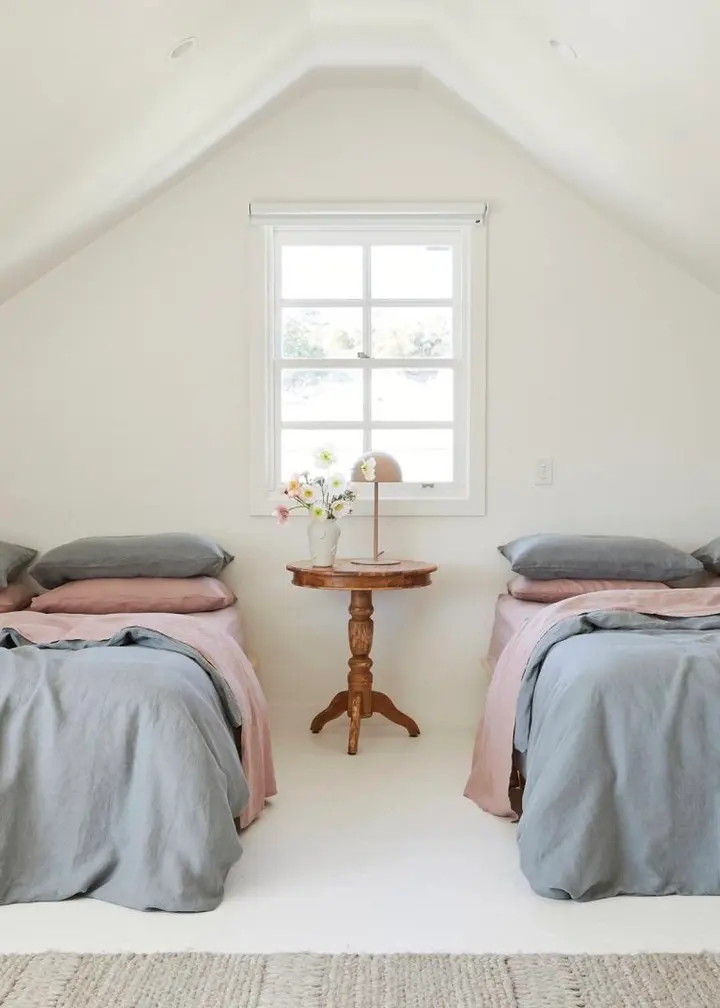
Do You Need a Sleep Divorce?
Sleeping solo could give you a better night of rest.
When you first move in with your partner, it can be a rude shock. Sure, every night feels like a sleep over, and it’s fun showing each other Tiktoks, asking them if they’d still love you if you were a worm, and being able to snuggle before you go to sleep and right as you wake up.
But it can also be a serious inconvenience. Whether your partner is a tosser and turner, a 2 am toilet visitor, a midnight sonnet reciter, a non-stop cougher, a duvet hogger, a profuse sweater, a 5 am alarm setter (or snoozer), or someone who likes to watch Facebook Reels at full volume til midnight, chances are they interrupt your sleep in some way or another.
As nice as it is to sleep next to your partner, sometimes it isn’t the easiest thing to do with coinciding sleeping patterns and preferences. Enter: the sleep divorce. What some might call radical, others consider extremely practical, and the perfect solution to ensure both of you get a good night’s rest. As the name suggests, a sleep divorce is where a couple decides to sleep in separate beds, ideally so both parties can get sleep better.

Image credit: 'I Love Lucy' 1951
For nearly a century between the 1850s and 1950s, sleeping in separate beds was the norm for married couples in America. “Separate beds were seen as a healthier, more modern option for couples than the double.” writes culture editor Alison Flood in The Guardian. “With Victorian doctors warning that sharing a bed would allow the weaker sleeper to drain the vitality of the stronger.”
This phenomena was slowly fazed out in the 1960s, but is starting to make a resurgence again as couples are starting to prioritise sleep over snuggles. With more than 355,000 views for the hashtag #sleepdivorce on TikTok, it’s definitely a ‘thing’. “Growing anecdotal evidence suggests more and more couples across all demographics are turning to sleeping in separate beds or separate bedrooms, all in the name of a better night of shut eye,” writes counselling psychologist Elisabeth Shaw in Body and Soul.
Journalist Edwina Bartholomew recently wrote about how sleeping in a separate bedroom from her husband Neil Varcoe for the past seven years has been “the secret to our happy marriage.”
Edwina and Neil first trialled the method three years into their relationship, as their morning and evening schedules were so different. After having children together, the couple still use this method. “I would sleep overnight with the baby in my room and then he would wake up early to take over. Ten years into our relationship and five years into our marriage, it works a charm.”
1. One (or both) of you snores
Don’t be embarrassed. 25 per cent of adults snore regularly, so the chances of either you or your partner “honk shoooooooo-ing” every night is very high. If your partner’s snoring causes you to wake up during the night, try giving sleeping in separate beds a go. Continually waking up throughout the night is not only annoying in the moment, but also affects your sleep quality which will negatively impact your mood and productivity the following day.
2. One (or both) of you sleep talks
While it can be entertaining to hear babbling nonsense and one-liners spoken in fluent gibberish at 2 am, this constant interruption to your sleep every night isn’t doing you any favours. If you or your partner are prone to reciting prose in the middle of the night, try sleeping in separate rooms to save both of you the interrupted rest.
3. You have different chronotypes
Chronotypes are a classification system that has been developed to help us understand different sleep and productivity schedules. There are four different chronotypes, and if you and your partner have different ones, you could consider trialling a sleep divorce to combat getting a poor night’s sleep.
4. One (or both) of you is guilty of blanket hogging
We’re not going to ask you to admit who the main culprit is, but if there is some blanket hogging, snatching, tugging – whatever you want to call it – during the night, giving a sleep divorce a go will stop all of that completely. Sleeping in separate beds will allow you and your partner your own space to stretch out, to pull the covers in any direction you please, and to not feel guilty the next morning about one of you getting cold.
5. You have different sleeping temperatures
Speaking of getting cold, who here has a different sleeping temperature than their partner? Up to 41% of the population experience night sweats, which leaves the rest of us either feeling cold or somewhere in between while we sleep. If your partner is prone to getting hot in their sleep, you could try sleeping in separate beds with duvets of different thicknesses to suit the needs of both of your sleeping temperatures. If you can’t give up your snuggles, you could also try giving the Scandinavian sleeping hack a go.
6. One of you is feeling sick
This one seems obvious, but very few people in relationships follow through with sleeping in separate beds when one of them is under the weather. Apart from the obvious result of sleeping next to a sick person and waking up with the same illness they have, sleeping next to someone who’s feeling unwell also leads to you having a rough night’s sleep. Constant coughing, tossing and turning, trips to the bathroom, and top-ups of water and medication throughout the night will not only keep you awake but leave you exhausted the next day.
Enjoyed This?
Learn more about sleep health.











